#Nigerian Civil War
Explore tagged Tumblr posts
Text
Learn about the Nigerian Civil War. Also known as the Nigerian-Biafran War.
0 notes
Text
Exploring the Rich Culture of the Ibo People in Nigeria: A Comprehensive Guide to One of the Largest Single Ethnic Groups
Disclosing the Rich Tapestry of Igbo Heritage: An in-depth examination of Nigeria’s Dynamic Culture Nigeria’s Igbo people are an enthralling ethnic group with a rich history, colorful customs, and a significant influence on African culture. This essay explores the fundamentals of Igbo culture, looking at its traditions, historical foundations, and remarkable resilience in the face of adversity.…
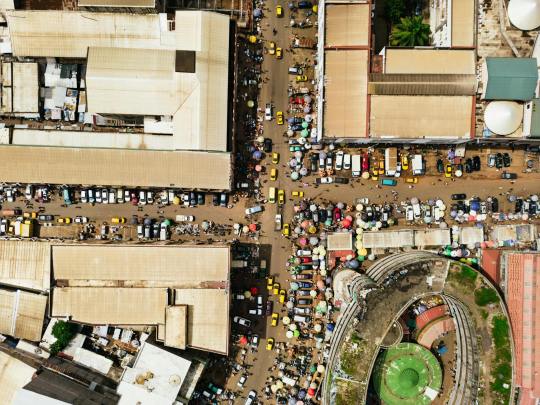
View On WordPress
#African heritage#Ibo people#Igbo culture#Igbo diaspora#Igbo history#Igbo language#Igbo traditions#LanguageXS#Nigerian Civil War#Nigerian ethnic groups
0 notes
Text
For the last day of Black Military History, the various ongoing and one very recent wars of Africa:
Today, for the last day in Black Military History, the ongoing wars in Africa. There are a grand total of 35 wars, so only a few are being focused on. I covered the events in the Congo and in the Sudan in greater depth before Black History Month and will be returning to them again because I refuse to allow these histories to exist solely in the shadow of Gaza....or of Ukraine, for that matter. Suffering is not an Olympic sport, there are no gold medals for 'best suffering in a genocidal catastrophe.' Leaving the Congo and Sudan wars for last because those are the ones with which people are the most familiar, I begin with the conflict that is why I can never take Hannah Nikole-Jones' Hotepian posture seriously and why no-one over the age of three should.
This is the one in the list that is not, actually, ongoing but is relevant all the same as an illustration of factors that play into the ones that really are. It was a war launched on a small scale by an overmighty oil corporation that stole land from the Ogoni people and operated to smash them with genocidal violence. It is why anyone who takes money from Shell is morally compromised on 'ability to unambiguously claim genocide is in fact a crime.'
And Hannah Nikole-Jones has done precisely this, because the suffering of the Ogoni people does not count, because her sense of empathy is very specifically defined ways that would do tremendous damage to her posturing on who and what she is if more people cared about what companies like Shell get up to in countries like Nigeria.
#lightdancer comments on current events#nigerian civil wars#ongoni war#hannah nikole-jones#black history month
4 notes
·
View notes
Photo
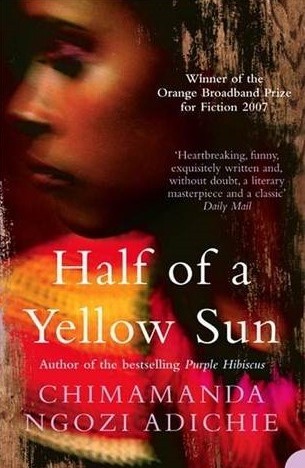
(via Half of a Yellow Sun by Chimamanda Ngozi Adichie)
Half of a Yellow Sun is a novel by Chimamanda Ngozi Adichie on Nigeria in the 1960s. It vividly portrays the struggles and tensions of the society in a nation that had barely started breathing in its nascent independence. The British had just left in 1960 leaving the country to be governed by its own people. However, the citizens are not united; there is a wide rift between the Northern and Southern regions as is often the case with almost any north-south geography. The North has tribes, mainly Hausa, Yoruba and the like, while the South and the East are predominantly Igbo people. The differences between the two communities are starkly pronounced.
Odenigbo and his partner Olanna are Igbos and teach in the Nsukka University in the South. Olanna’s sister Kainene oversees her father’s businesses in Port Harcourt, and lives with her English lover Richard who has come to Nigeria to research heritage arts, particularly Igbo-Ukwu art. The sisters come from an affluent family living in the richest area of Lagos, the largest city of Nigeria. Additionally, we meet Ugwu, Odenigbo’s houseboy, who initially appears insignificant, but keeps the plot moving as the author narrates the story in many places by describing the thoughts going on in his head tracing his observations and convi... (Read full text on booksperience.org)
#books#reading#chimamanda ngozi adichie#africa#african history#biafra#civil war#fiction#half of a yellow sun#hausa#history#igbo#kainene#nigeria#nigerian history#odenigbo#olanna#tribal sentiments#tribes#ugwu#yoruba#booksperience
1 note
·
View note
Text

Published: this week, January 2025. From Okorafur's website:
Disabled, disinclined to marry, and more interested in writing than a lucrative career in medicine or law, Zelu has always felt like the outcast of her large Nigerian family. Then her life is upended when, in the middle of her sister’s lavish Caribbean wedding, she’s unceremoniously fired from her university job and, to add insult to injury, her novel is rejected by yet another publisher. With her career and dreams crushed in one fell swoop, she decides to write something just for herself. What comes out is nothing like the quiet, literary novels that have so far peppered her unremarkable career. It’s a far-future epic where androids and AI wage war in the grown-over ruins of human civilization. She calls it Rusted Robots.
When Zelu finds the courage to share her strange novel, she does not realize she is about to embark on a life-altering journey—one that will catapult her into literary stardom, but also perhaps obliterate everything her book was meant to be. From Chicago to Lagos to the far reaches of space, Zelu’s novel will change the future not only for humanity, but for the robots who come next.
A book-within-a-book that blends the line between writing and being written, Death of the Author is a masterpiece of metafiction that manages to combine the razor-sharp commentary of Yellowface with the heartfelt humanity of Tomorrow and Tomorrow and Tomorrow. Surprisingly funny, deeply poignant, and endlessly discussable, this is at once the tale of a woman on the margins risking everything to be heard and a testament to the power of storytelling to shape the world as we know it.
27 notes
·
View notes
Text



(The trump pic made me laugh so I had to include it)
Robbie there is just right on the edge of getting it, at least he seems to know that this is something that took place.
The reason they're telling his story, if it is based on him, is because why not tell his story, we've got 1000 pieces of media about
This is a article from 2010 about the guy robbie mentions there.
As London suffered the full force of the German Luftwaffe bombing raids 70 years ago this week the story of Nigerian Ita Ekpenyon has been uncovered by the City of Westminster Archives.
The blitz and the response of Londoners is now the stuff of legend and the story of Ita demonstrates that integrity, responsibility commitment and sacrifice are not qualities confined to the English.
Ita Ekpenyon is the personification of London’s Blitz spirit and he along with over 15.000 Africans living in London at the time are for the first time being recognised and their bravery acknowledged.
Ita Ekpenyon was one of over 200,000 Londoners who volunteered as Air Raid Protection (ARP) wardens.
Black British experiences from the Blitz, is now being told by City of Westminster Archives in a new project funded by the Heritage Lottery Fund.
Ita arrived in London from Nigeria in 1921 at the age of 28. When war broke out in 1939 he was living at 146 Great Titchfield Street, near Oxford Circus, and studying to become a lawyer.
At 46, Ita was too old for military service but his sense of civic duty led him to volunteer for civilian defence duties. On 5 February 1940, Ita was enrolled as an ARP Warden with D Section, St Marylebone Borough Council Civil Defence Volunteer group. According to his unit’s records, he experienced raid after raid, putting out incendiary bomb fires, giving first aid and conducting population counts as the bombs fell all over the capital. ______________________________________
Sounds like a story that's begging to be told to me right there, kinda wish that was what it is about, looks to be more than that though. _________________________________________
George, McQueen’s child protagonist, was inspired by a picture the filmmaker came across while researching his television series Small Axe, which showed a small black boy being evacuated from the city. On his journey back home to his mother after being evacuated, George discovers much about his city – and himself.
A key scene shows George wandering through the old Islington Empire Arcade, encountering dioramas and murals of black workers, ever under the control of their white colonial masters. There he meets Isey, a Nigerian air raid warden, who cares for him and finds him a space in a shelter.
The shelter shows the diversity of blitzed London that was captured by the photographer Bill Brandt: Jewish families, Sikh families and white families crammed together in the squalor of the makeshift shelters below the city in the first weeks of air raids. When a white couple try to segregate the shelter by race, Isey reprimands them, reminding them that they are all fighting Hitler and the Nazi belief in a race war.
Blitz deserves to find a large audience. Not just because it retells a familiar story in a new way and gives voice to those whose stories are often overlooked, but because of what it has to say about who those blitzed Londoners, so central to British memory of the war, actually were.
In imagining the story of that small boy in the photo, McQueen helps us to re-imagine not just the blitz, but wartime Britain more widely. His sprawling, dramatic film reminds us that this is a shared history, one with meaning for many more people today than we might usually remember. ____________________________________
Aside what ever current year stuff they shoehorn in this seems like a good concept for a film.
And as for the answer to the question of "why" I'll say it's because it's the film the filmmaker wanted to make if you don't want to watch it then don't if you'd like a different story told then tell it yourself. _____________________
Here's some more about Contributions by Black Britons during the Blitz, because apparently some people didn't think they existed or contributed, or aren't worth mentioning or something.

For Black History Month historian Stephen Bourne tells us about some of the Black people involved in the fire service in the 1930s and 40s.
And I'll end with, the Steve McQueen making this movie is a totally different one than the one that died in 1980, in case there was any questions about that.
19 notes
·
View notes
Text
yeah lol! you know it’s bad when even the UK isn’t defending portugal
youtube
new favorite video
9 notes
·
View notes
Text
Reading king leopold's ghost so I can read heart of darkness so I can read chinua achebe so I can read about the nigerian civil war so I can read half of a yellow sun so I can understand what my professor was talking about in that one lecture several months ago when he randomly started explaining his ideas about historiography by referencing something chimamanda adichie said about hating conrad in a ted talk which nobody there had seen
#net W though because I'm obsessed with achebe's writing now and will order the rest of his books as soon as I get home#reading#jory.txt
18 notes
·
View notes
Text
by Melanie Phillips
he outspoken chief rabbi of South Africa, Dr. Warren Goldstein, has once again given voice to crucial truths that others have shamefully ignored.
He accused both Pope Francis and the Archbishop of Canterbury, Justin Welby, of being indifferent to the murder of black Christians in Africa and the terrorism threat in Europe while being “outright hostile” to Israel’s attempts to battle jihadi forces led by Iran.
“The world is locked in a civilizational battle of values, threatened by terrorism and violent jihad,” said Goldstein. “At a time when Europe’s very future hangs in the balance, its two most senior Christian leaders have abandoned their most sacred duty to protect and defend the values of the Bible. Their cowardice and lack of moral clarity threaten the free world.”
Goldstein’s blistering accusations were on the mark.
Christians in Africa have been subjected to barbaric slaughter and persecution by Islamists for decades. Two years ago, Open Doors, an organization that supports persecuted Christians, observed: “In truth, there are very few Muslim countries—or countries with large Muslim populations—where Christians can avoid intimidation, harassment or violence.”
In January 2024, a report for Genocide Watch confirmed that, since 2000, 62,000 Christians in Nigeria have been murdered by Islamist groups in an ongoing attempt to exterminate Christianity. In addition, more than 32,000 moderate black Nigerian Muslims and non-faith individuals have been massacred.
According to a report in 2020 by the United States Commission on International Religious Freedom, Christians in Myanmar, China, Eritrea, India, Iran, Nigeria, North Korea, Pakistan, Russia, Saudi Arabia, Syria and Vietnam are being persecuted.
These facts were reported in June by Peter Baum for The Daily Blitz. Yet the mainstream media all but ignore these atrocities. There are no marches in Western cities to accuse these countries of facilitating crimes against humanity. There are no NGO-inspired petitions to the International Court of Justice (ICJ) to declare these countries and groups guilty of genocide.
Instead, the media and Western elites demonize Israel as the pariah of the world for defending itself against these genocidal Islamists. This unique and egregious double standard is the hallmark of classic antisemitism.
The attitude of the church leaders is even more astonishing. The hundreds of thousands of victims of this persecution are their flock. The goal of this onslaught is the wholesale destruction of the faith they lead.
Yet from Welby and the pope have emerged little more than occasional expressions of measured concern. And even then, they usually refuse to call out what’s happening by its proper name—the Islamist war to eradicate Christianity and destroy the West.
The 10-month war against Israel by Iran and its proxies following the Oct. 7 pogrom is a crucial front in that onslaught against Western civilization. Yet as Goldstein said, the pope and Welby have stood passively by while African Christians are “butchered by jihadi groups with direct ties to Israel’s enemies in Gaza and the West Bank.”
The jihadi ideology, he said, was also a clear and present danger to Europe. As a result of open-border policies, immigrants poured into the United Kingdom and across Europe, many of them “brandishing a violent jihadi ideology deeply hostile to Christianity, liberal democracy and western values.”
The result has been surging antisemitism leaving Diaspora Jews living in fear. Yet on the ideology fueling this civilizational onslaught, Welby and the pope have been silent. Instead, they have recycled the Islamists’ propaganda that demonizes and delegitimizes Israel with lies.
#dr warren goldstein#chief rabbi of south africa#the pope#jihadi ideology#justin welby#archbishop of canterbury#israel#international court of justice
20 notes
·
View notes
Text
Chidi Anagonye was raised in Senegal
As Kamilah tells us in season 3, "Chidi" is an Igbo word meaning "God exists" (double checked with Behind the Name)
Chidi's father, Emeka, also has an Igbo Name
The Igbo people are from Nigeria
Nigeria is not close to Senegal. They are about 2,500km/1,550mi apart.
According to Wikipedia, there is not a significant Igbo population in Senegal
Chidi's mother, Ndeye, does have a Senegalese name. (x) (x) (x) (it's not on Behind the Name but several other websites agree that is from the Wolof language in Senegal, so... here's hoping they're right)
Ok so now I have SO many questions about Chidi's family. Did Emeka immigrate to Senegal? Why Senegal? Chidi's birth year is set to about 1982/1983, and the Nigerian government was having crisis after crisis at the time. Colonialism looms large over this entire story for obvious reasons. Nigeria gained independence in 1954, and Senegal in 1959. Nigeria had two coups in 1966, followed by civil war from 1967-1970. There was an oil boom in the 1970s, but obviously the people did not see much of the profits from that as the military government had no interest in raising the standard of living. There was another coup in 1975, and then another in 1976. From the early 80s to 1999, the Nigerian government was a corrupt military dictatorship before democracy was reinstated (x).
In comparison, Senegal had a much more consistent government committed to democracy, diplomacy, and human rights. There was violent conflict and border tensions, but broadly things were more stable, and Wikipedia claims Senegal had "one of the more successful post-colonial democratic transitions in Africa" (x).
All this stuff could never be explored in the show for obvious reasons: it's a comedy (showrun by a white man and made almost entirely by Americans), but I'm still left wondering about it. What was it like for Emeka to move so far away from home? What was it like for Chidi to grow up both Wolof and Igbo, with an Igbo name? How did Emeka keep him in touch with his roots that were thousands and thousands of miles away, or did he encourage assimilation instead? Was this challenging at all for Chidi, growing up?
Also, and I'm going to preface this by saying I am in no position to write this arc/plotline, but I think there's something to be said here, and it could've fit really well into the story if there were west African writers in the writers room who wanted to explore this. Chidi's whole thing is about choice, and he is someone from two different cultures. They could've written a story about Chidi learning not to see himself as two separate halves, but one whole person. But tbh? I don't think they cared to. I'm not sure how much of this is intentional, how much of this implied story of an immigrant leaving his home for greener pastures, falling in love with a woman, and having a baby who then finds making a choice between two things the biggest challenge in the world was intentional, versus how much they just googled "African names." I know Chidi's name is somewhat intentional, given how they explicitly bring up its etymology in season 3, but do they care that the Igbo people are not from or in Senegal? They did seem to forget that Chidi says his native language is French in season 1. Plus they are sorta forced to gloss over the fact that Chidi's actor is American and has an American accent. Or maybe this was 100% intentional and hidden in there for people who either know all of this already or bother to google stuff. I don't know. I just remembered that the Igbo people are from Nigeria and Chidi has an Igbo name, and was pretty sure Chidi didn't say he was Nigerian, so I googled him and went to his fandom wiki page and fell down the rabbit hole from there.
(I am not west African nor do I know much about the histories and cultures of west Africa, so all my sources have been linked in this post, which were Wikipedia and name websites, my apologies if there are any errors in this post, and if there are, please feel free to correct me.)
16 notes
·
View notes
Text
Peter Bennet, the teenage boy whose tired of life

Ever since his parents divorced, Peter hasn't really been the same. All he has strength to do is to study or help his mum at her apothecary shop Mystic Wonders, not really interested in making friends or all that kind of shit. His dad a cop, his mum a fortuneteller, his life a mess, Peter is sarcastic and a little negative about life.
One day, while sorting through some stuff in the shop, he comes across a ring. Thinking it becomes to the jewellery section, he cleans it and releases the magical essence of Jazzie, a genie who has been trapped in the ring since the Nigerian Civil War. Although Jazzie is a little bit mistrustful about new masters and Peter has always been a skeptic about magic, this two make an unexpected bond that goes beyond the usual 'master-servant', it just might be friendship. Worst, sibling-like friendship.
Great. As if high school wasn't hard enough without a genie by your side.
6 notes
·
View notes
Note
So you're Nigerian and white; what's the white side of you?
My mum is white (born and raised in Britain), my dad is black (born and raised in Nigeria) but I live in Britain because Nigeria is currently not super safe (civil war and such) plus my mum is very monolingual
29 notes
·
View notes
Text
Book recs: post- and transhumanism
AKA: cyborgs, uploaded minds, and humans otherwise altered by technology.
I have previously written a rec list for books featuring robots and artificial intelligences, but ended up excluding various titles for not quite fitting the theme. Hence, this list, which focuses more on the step from human into something else, commonly with themes of what it means to be human.
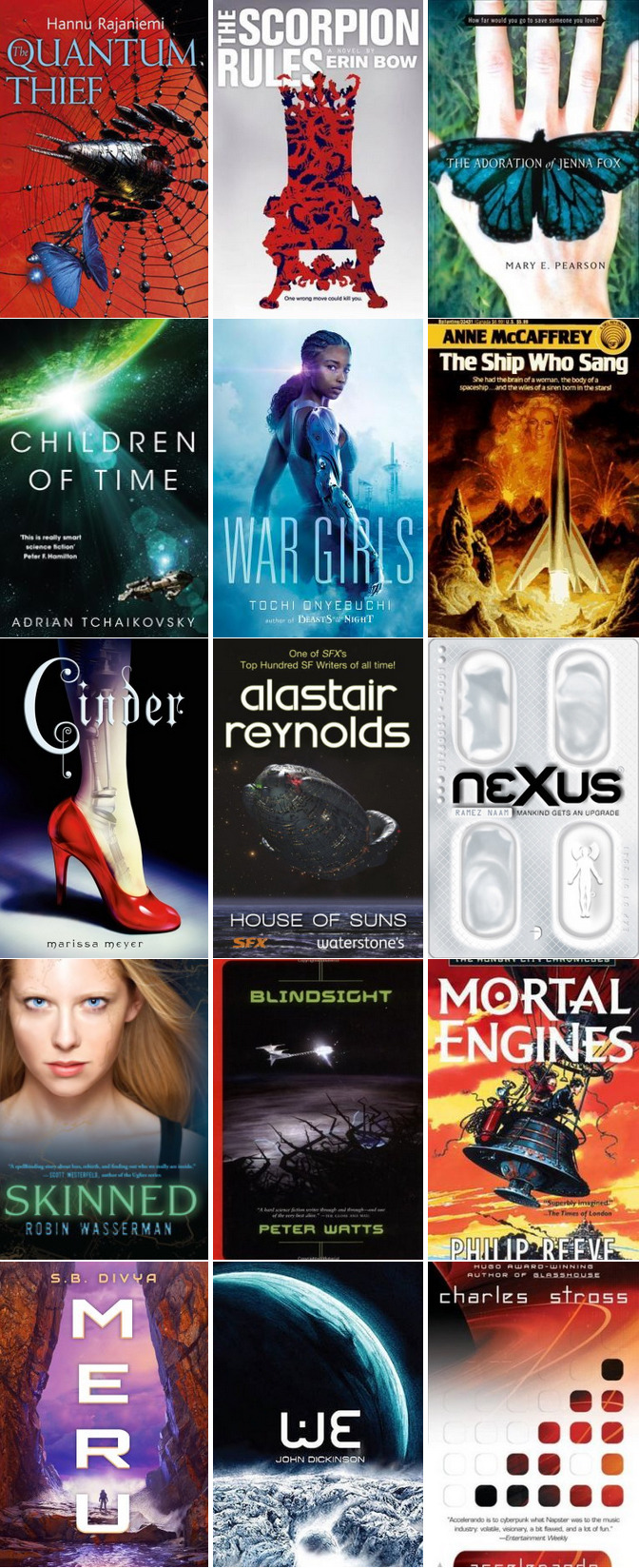
Previous book rec posts:
Really cool fantasy worldbuilding, really cool sci-fi worldbuilding, dark sapphic romances, mermaid books, vampire books, portal fantasies, robots and artificial intelligences
For more details on the books, continue under the readmore. Titles marked with an * are my personal favorites. And as always, feel free to share your own recs in the notes!
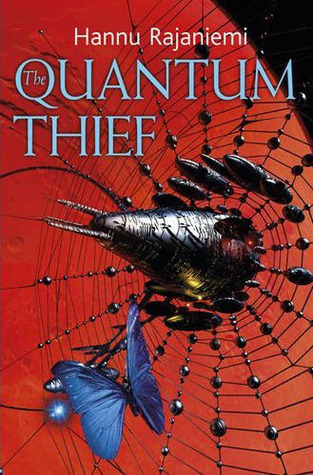
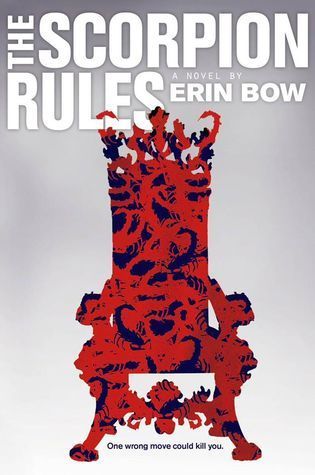
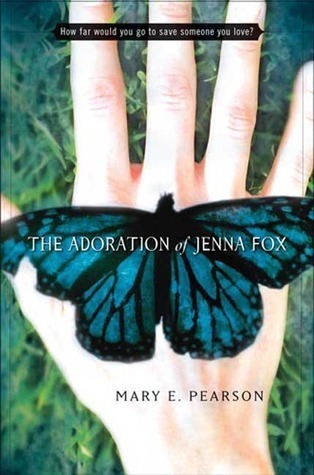
The Quantum Thief by Hannu Rajaniemi*
Place this one in the category of ‘accept that you’re gonna be confused as hell and just let the world wash over you’. The singularity has come and gone and humans can now easily upload, download and copy themselves into new bodies, not all of them human and not always willingly. Consciousnesses and time has become something close to currency. Follows a murder mystery on Mars.
The Scorpion Rules (Prisoners of Peace duology) by Erin Bow*
Young Adult. Featuring a dystopian future in which an AI forcibly keeps world peace by holding the children of world leaders hostage. If anyone attempts to start a war, their child will be executed. Greta is one of these children, kept in a school with others like her. But things start to change one day when a new, less obedient hostage arrives. A unique, slowburn take on the YA dystopian craze, also featuring a bisexual love triangle.
The Adoration of Jenna Fox (Jenna Fox Chronicles) by Mary E. Pearson
Young Adult set in a near future. Jenna wakes from a year long coma after an accident, and something is wrong. Is this really her life? Are her memories her own? Exactly what happened a year ago, and what did her parents do to get her back?
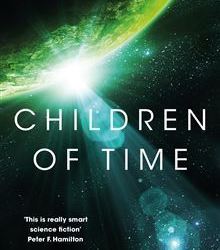
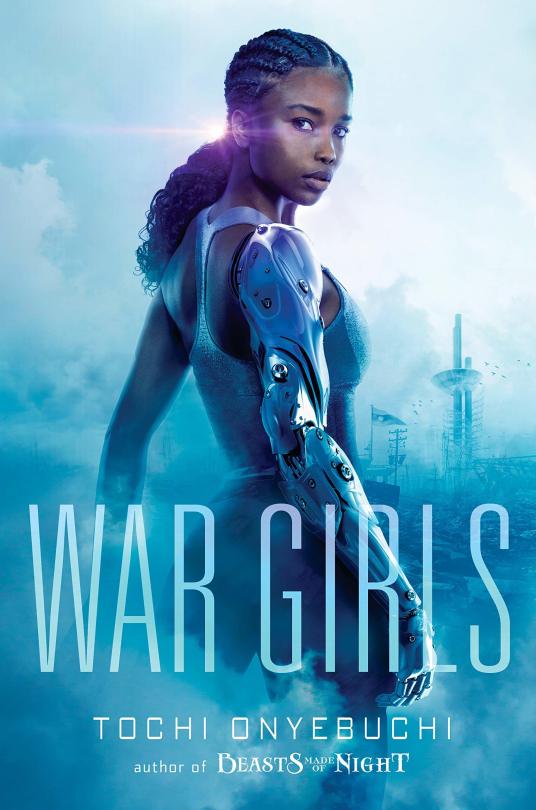
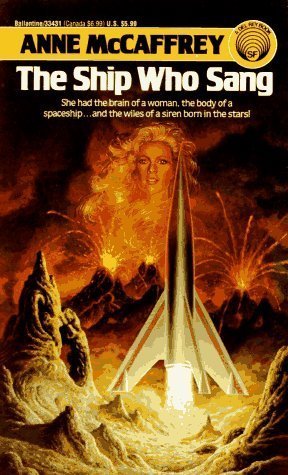
Children of Time by Adrian Tchaikovsky*
Millenia and generation spanning scifi. After the collapse of an empire, a planet once part of a project to uplift other species to sentience is left to develop on its own, resulting not in the intelligent monkeys once intended but in sentient giant spiders. Millenia later, what remains of humanity arrives looking for a new home, only to be met by the artificial remains of the ancient woman who once led the uplift project - and she is not willing to let them on her planet.
War Girls by Tochi Onyebuchi*
In an enviromentally fraught future, the Nigerian civil war has flared back up, utilizing cybernetics and mechs to enhance its soldiers. Two sisters, by bond if not by blood, are separated and end up on differing sides of the struggle. Brutal and dark, with themes of dehumanization of soldiers through cybernetics that turn them into weapons, and the effect and trauma this has on them.
The Ship Who Sang by Anne McCaffrey
1969 classic. Features a future in which children born too weak to survive are put into and raised in mechanical bodies. Helva, one of these children, grows up to be put in charge of her own space ship, from which she works to fulfill various missions out in space, missions which she quickly comes to learn are much more dangerous than she could've imagined.
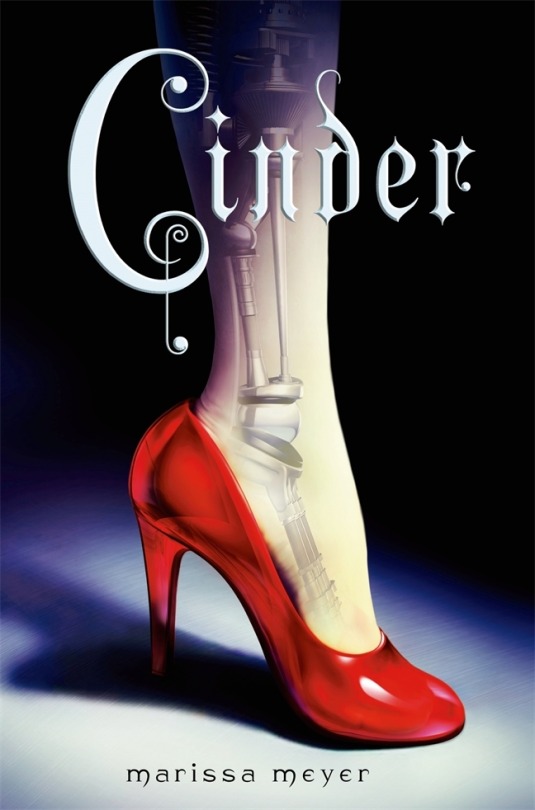


Cinder (The Lunar Chronicles) Marissa Meyer*
Young Adult fairy tale retelling. Cinder, a cyborg with a mysterious past she can't remember, lives with her stepmother and two stepsisters in New Beijing as a deadly plague ravages the world and a race of Lunar people threaten war against the entire planet. As Cinder becomes entwined with the young prince Kai, she is pulled more and more into dangerous politics that see her as less than human due to her cybernetics, yet need her to save them.
House of Suns by Alastair Reynolds
Six million years in the future, humanity has spread across the entire Milky Way galaxy. Purslane and Campion are both clones of the same woman, sent into the galaxy millions of years ago to explore along with almost a thousand clones like them. Every 200 000 years they all meet to compare memories and experiences. But this time Purslane and Campion arrive late - and discover that a secret millions of years in the making has lead to an extinction level attack against their kind. Now they must find out the truth before their line is completely wiped out. Absolutely wild world-building, featuring various kinds of posthumans (among which the clones are, shockingly, the most similar to people of our time).
Nexus (Nexus trilogy) by Ramez Naam
In a near future, a nano-drug is developed that can link human minds together, having the potential to change humanity forever. As different factions fight over it - some wanting to control it, other to eradicate it, and many to exploit it - a scientist who's caught improving the drug is thrust into a world of danger and international espionage.
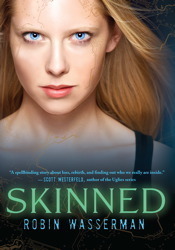
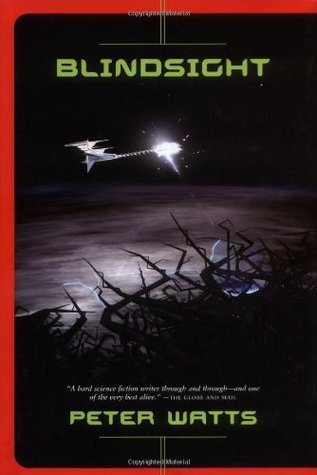
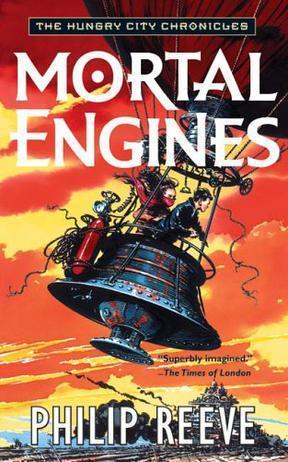
Skinned (Cold Awakening trilogy) by Robin Wasserman
Young Adult. Rich girl Lia Kahn had the perfect life - until she died and was brought back by having her memories downloaded into a mechanical body. Despite having her life back, Lia also finds her life changed, as people fear her and treat her differently. Worse; she herself isn't sure if she's still really Lia, or whether she's even a person at all anymore.
Blindsight (Firefall duology)by Peter Watts*
Vampires and aliens and questions of the nature of consciousnesses, oh my. A ship is sent to investigate the sudden appearance of an alien vessel at the edge of the solar system, but the crew, a group of various level of transhumanism, isn't prepared for the horrors awaiting them. No, seriously, this book will fuck you up, highly recommend if you’re okay with a lot of techno babble and existential horror.
Mortal Enginges (Mortal Engines quartet) by Philip Reeve*
Young Adult. On a barely survivable Earth humanity has taken to living on great wandering cities, hunting each other across the plains for resources. Tom lives in London, but when he intervenes to stop a murder, he falls off the city alongside a strange and hostile girl on the hunt for revenge. Together they set out to catch up to the city, but are chased by a murderous machine like being set on stopping them. Trans/posthumanism isn't the main theme of the book, but it continues to grow in importance throughout the series.
Bonus AKA I haven't read these yet but they seem really cool
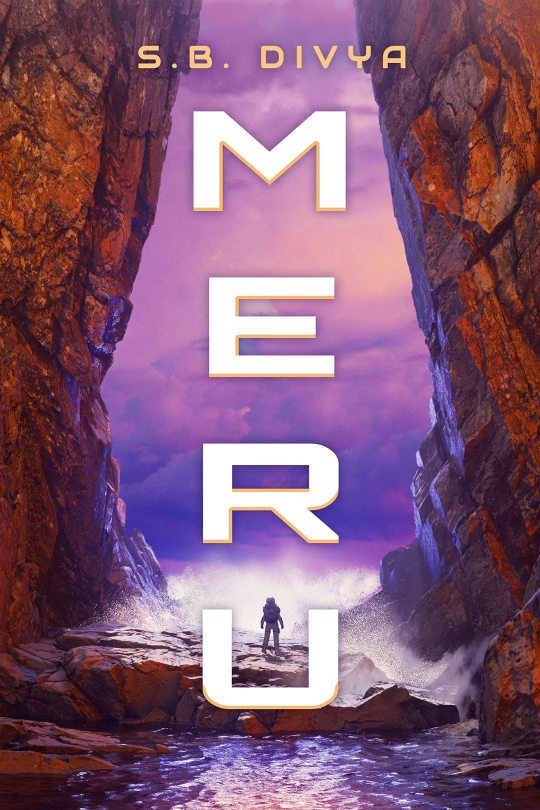
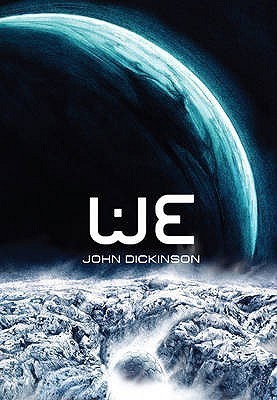
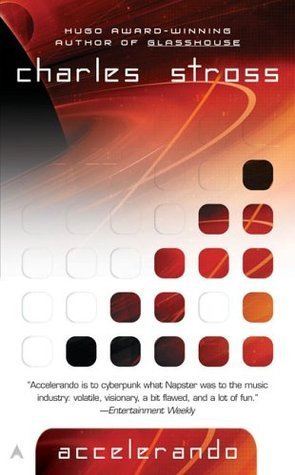
Meru by S.B. Divya
A human and a posthuman, called an alloy, venture together into space to explore a newly discovered, earth-like planet, testing the future of the relationship between their peoples on the way.
WE by John Dickinson
Humanity has become a hive mind, constantly connected. When Paul is sent on a one-way mission to a frozen moon, he must disconnect from the rest of humanity, for the first time seeing what it has truly become.
Accelerando by Charles Stross
In a time in which the artificial and the posthuman is more and more outpacing the human, something strange enters the solar system and starts dismantling its planets.
Honorary mentions AKA these didn't really work for me but maybe you guys will like them: We Are Legion (We Are Bob) by Dennis E. Taylor, Down and Out in the Magic Kingdom by Cory Doctorow
#surprise I'm back!!#i still have a couple of these posts in my drafts#next one will probably be the alternate timelines one i just need to wait out the library waiting list first lmao#nella talks books#the quantum thief#the scorpion rules#the adoration of jenna fox#children of time#war girls#the ship who sang#lunar chronicles#house of suns#nexus#cold awakening#blindsight#mortal engines
60 notes
·
View notes
Text
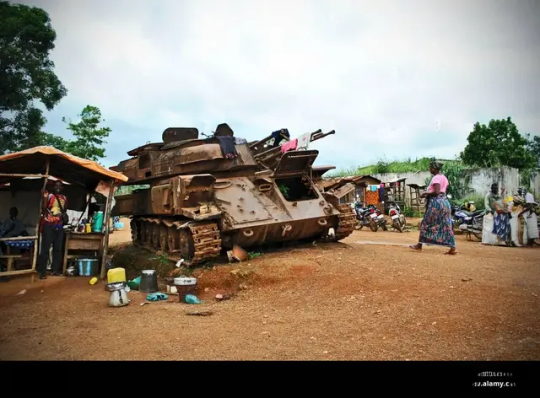
Nigerian ZSU-23-4 now part of daily life during the Sierra Leone Civil War.
12 notes
·
View notes
Text

Thinking about the Nigerian civil war again.
Don’t go to wiki page expecting to see this. It’s sadly not there anymore.
9 notes
·
View notes
Text

https://www.reuters.com/world/africa/nigerian-airstrike-kills-24-kaduna-state-village-residents-say-2024-09-30/
7 notes
·
View notes